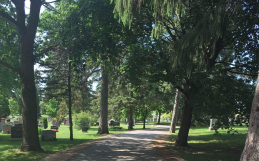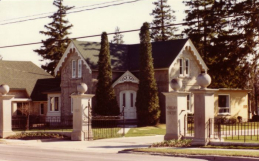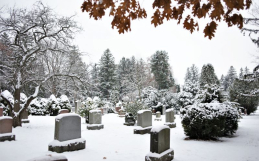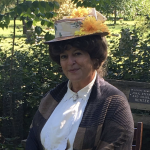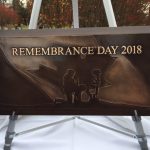2018 Remembrance Day Service for Woodlawn Memorial
By Susan Farrelly
Walter Smith was born in Plymouth, England on December 4, 1889, and he had a brother named Albert and a sister named Flossie. Prior to World War I, Walter Smith emigrated to Canada. It wasn’t long after his arrival in Canada when the Great War started. Walter’s brother Albert joined the Royal Navy. Albert never returned from the War, and it was believed that he perished while at sea. Walter enlisted with the 35th Battalion on June 12, 1915 in Niagara, Ontario at the age of 25.
The 35th Battalion was an infantry battalion of the Canadian Expeditionary Forces (CEF) during World War I and provided reinforcements to the Canadian Corps in the field until January 4, 1917, when its personnel were absorbed by the 4th Reserve Battalion, CEF. It was at this time that Privates were paid $1 per day, with a premium payment of 10 cents per day for being overseas, and a bonus of $20 paid upon separation.
For the first two years of Walter’s service, he spent time training with the Canadian Army Service Corps. In November 1917, he was transferred to the Canadian Forestry Corps. It was shortly afterwards in February 1918 when Walter’s service took him overseas as he joined the 75th battalion. Walter served with the Royal Canadian Dragoons and also with the Canadian Corps Composite Company. It was during this time that Walter was exposed to mustard gas poisoning.
During the Great War, chemical warfare was both prominent and devastating. Dubbed ‘King of the Battle Gases’, mustard gas was used for the first time in 1917 by the German forces. The following year, the allies began using mustard gas against the German troops. By the time World War I ended on November 11, 1918, there were 1.3 million casualties caused by chemical weapons, mostly due to exposure to mustard gas, chlorine and phosgene. Mustard gas caused the highest number of casualties from chemical weapons, but it caused few direct deaths because the open air of the battlefield kept concentrations below the lethal threshold.
Walter was discharged from the army in July 1919 when he was 30 years old. The discharging physician advised him to never have children. Due to the mustard gas exposure that Walter had endured, the Doctor said that his life would be shortened and that he wouldn’t be around to raise children.
Walter returned home and soon got a job working as a hired hand on a farm north of Toronto owned by another Smith family, Mr. and Mrs. Howard Smith. This family had sons Lester, Irwin and a daughter named Ruth. As love works in mysterious ways, Ruth was friends with a woman named Dorothy Auty and it was Dorothy’s sister, Sarah Auty, who caught Walter’s romantic interest. Walter must also have charmed Sarah, as a strapping 5’6” war veteran with blue eyes, fair hair and a tattoo of a girl in tights on his left arm.
Sarah and Walter eloped and were married in a Church on Yonge Street in Toronto in 1925. Sarah and Walter made their home in Guelph, living at 40 Toronto Street. Despite the Doctor’s orders, Walter and Sarah decided to have children. They had a son, Walter Edward Smith, also known as Bud, in 1927, and a daughter named Merle in 1928.
During this time, Walter worked as a machinist at Page Hershey, a factory that made pipes near Lyon Park on York Road. Walter also worked for the Royal Dairy delivering milk in a horse drawn wagon. Each driver was responsible for his own horse. This would be a favourite memory of Walter’s son, as on Saturdays his father would take him to the dairy barns to tend to his horse.
Walter stopped working at Royal Dairy in 1930 as his health was starting to decline due to the exposure to mustard gas during the war. Walter passed away in 1932 at the age of 43 when his son was only five years old and his daughter was four.
As was custom back then, the casket was placed in the dining room and respects were paid at their family home on Toronto Street. Walter Smith was laid to rest in the veteran’s section of Woodlawn Memorial Park in Guelph.
Life was difficult the following years for the young Smith family. Sarah worked at Casketworks at the corner of Wellington and Wyndham Streets, where she sewed the inner linings of caskets. Walter Jr. quit high school at age 16 to work at Bell Canada in order to help the family financially, which included supporting his sister Merle through nursing school. His mother Sarah never did remarry and she passed away in 1960. Both Bud and Merle lived long and full lives.
Had Walter abided by the doctor’s orders and not had children, his lineage of two children, nine grandchildren, 20 great-grandchildren, and 14 great-great grandchildren (a total of 45) would not have come to be. His legacy lives on in not only me as his great grand-daughter, but in all of our family members, many who are here with us today.
I ask that these direct descendants of Walter Smith join me up at the podium now to accept a rose to place on his grave after the service as we thank and celebrate our grandfather for his service, bravery and personal sacrifice for our country.
Source: https://www.sciencehistory.org/distillations/magazine/a-brief-history-of-chemical-war

